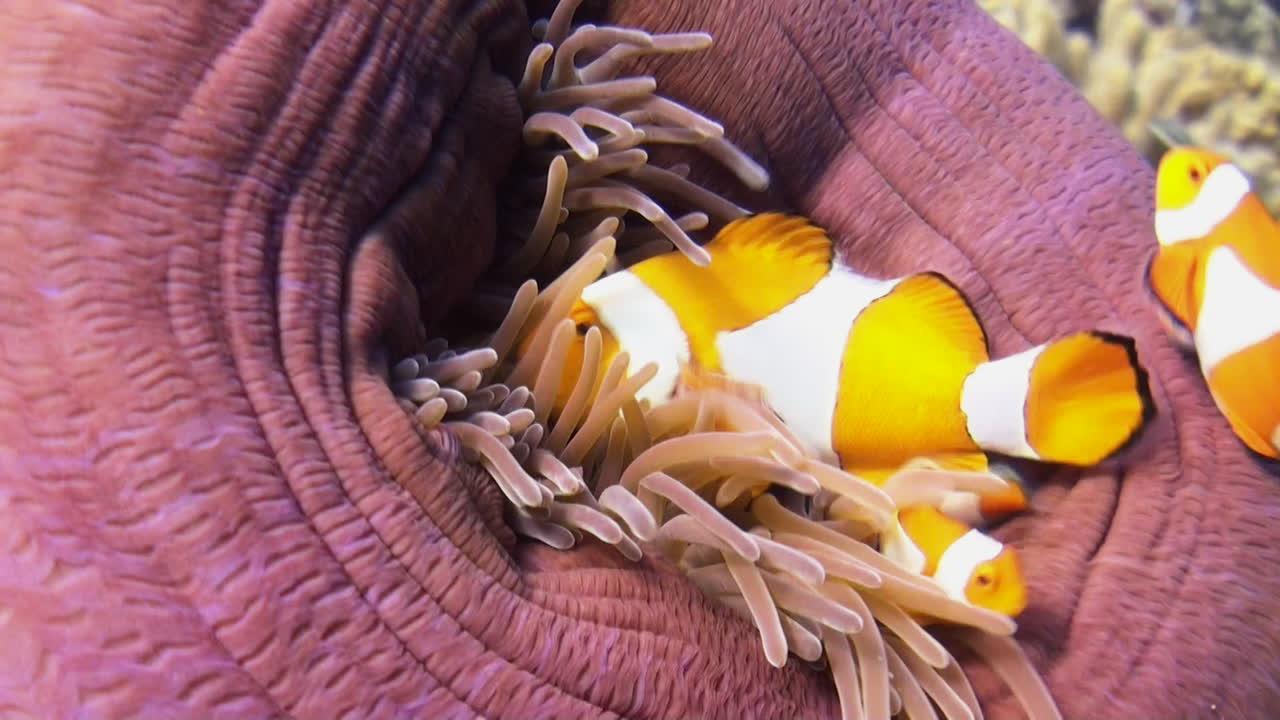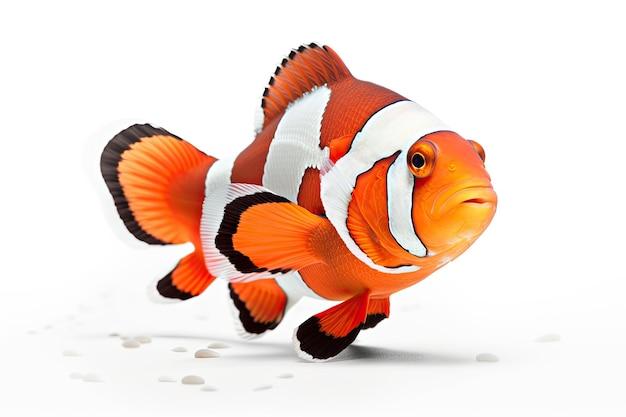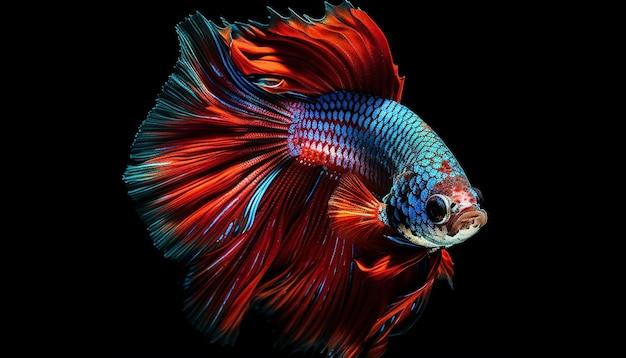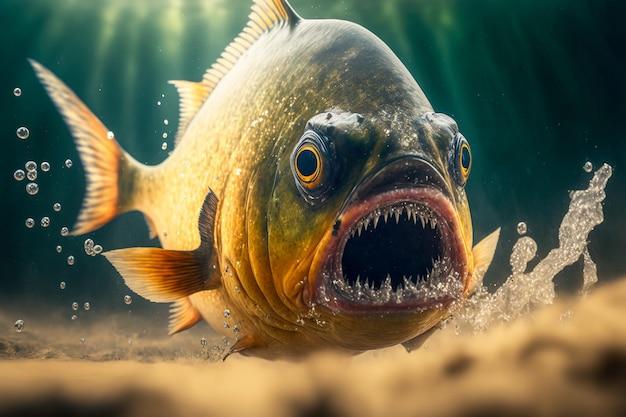Clownfish are often admired for their vibrant colors and unique personalities. These small, playful fish are a popular addition to home aquariums. However, there are times when clownfish can exhibit unexpected aggressive behavior, leaving their owners puzzled and concerned. In this blog post, we will delve into the reasons behind clownfish aggression and provide valuable insights on how to reduce and manage it. Whether you’ve noticed sudden aggression, twitching and biting, or even cannibalistic tendencies, we’ve got you covered! Let’s dive in and explore the fascinating world of clownfish behavior.
Clownfish Aggression: A Comedy of Fins
When it comes to the underwater world, clownfish are often celebrated for their vibrant colors and amusing antics. But did you know that behind those cute little eyes lies a potential for aggression? Yes, my friends, these charming creatures can sometimes get a tad feisty. So, hold onto your fins as we dive deep into the captivating world of clownfish aggression!
Unveiling the Aggression in the Underwater Paradise
-
Sibling Rivalry – Have you ever heard the saying, “There can only be one”? Well, it turns out that clownfish take this phrase quite seriously. In a comical twist of events, clownfish siblings may find themselves engaged in battles for dominance. With flaring fins and finesse, they establish hierarchy and claim their spot in the anemone abode.
-
Territorial Disputes – Just like us humans, clownfish also value their personal space. They zealously defend their territory, like a tiny landlord fiercely guarding their anemone-real estate from unwanted intruders. So, expect some theatrical displays of aggression if another clownfish dares to cross the invisible boundary.
A Game of Aggressive Attractions
-
Size Matters – While funny and endearing in appearance, clownfish have a strict pecking order based on size. The largest member of the group, usually a female, commands respect and determines who’s at the bottom of the fishy social ladder. It’s like a marine version of “The Biggest Loser,” only with fins and less reality TV drama.
-
Love, Clownfish Style – Ah, love is in the water! But even in the romance department, clownfish don’t shy away from a touch of aggression. When it’s time for mating, the male clownfish whirlwinds into a tizzy, showcasing aggressive behaviors to win over his potential mate. It’s like an underwater battle to impress, where the one with the most charisma (and dance moves) wins the heart of the lady fish.
Keeping the Aggression at Bay
-
Foolish Fins No More – To minimize clownfish aggression in your aquatic haven, providing ample space for each member is essential. The more room they have to explore and establish their territories, the less likely they are to engage in fin-flaring feuds. It’s like giving siblings their own bedrooms—less squabbles, more peace.
-
Mixing and Matching – Carefully selecting compatible clownfish species can also help keep aggression levels low. Some species are known to be more peaceful and cooperative, while others lean toward the sassy side. Just imagine throwing a diva and a zen guru together—they might not be the best roommates.
The Finale: A Clownfish Comedy to Remember
So, my finned friend, while clownfish aggression may seem odd and amusing, it’s a natural part of their underwater world. Whether it’s sibling rivalries, territorial tiffs, or love-struck skirmishes, these flashy fishies are always ready to put on a fin-tastic show. So, next time you stumble upon a submerged clownfish spectacle, remember to enjoy the comedy of fins that unfolds before your eyes!
Clownfish Suddenly Aggressive
Have you ever noticed your once-friendly clownfish suddenly exhibiting a surprisingly aggressive behavior? It can be quite a shock to witness these little aquatic characters unleashing their inner “Jaws”! Don’t worry, though, it’s not that they’ve undergone a spooky transformation. There are actually some pretty logical reasons behind this seemingly erratic behavior.
The Quest for Dominance: The “Who’s The Boss?” Game
Just like in any office drama, there’s a hierarchy among clownfish too. Each clownfish duo has an established pecking order, where one fish takes on the alpha role while the other takes the beta position. However, if something disrupts this delicate balance, all hell can break loose in your underwater paradise!
New Home, New Rules: They’re Just Settling In
So, you’ve recently introduced a new clownfish into your well-established tank community? Well, that can ruffle some underwater feathers! The addition of a new fish can lead to territorial disputes, as the seasoned residents may feel the need to assert their dominance and establish new boundaries. Sometimes, their aggression is just a way of saying, “Hey, newcomer, this is my turf!”
It’s All About the Ladies: Clownfish Couples and Their Swinging Ways
Clownfish couples are known for their monogamous relationships, living together in harmony for years. However, if a tragedy strikes and one of them passes away, the grieving partner may start searching for a new mate. This quest for love can trigger an aggressive frenzy, transforming your once docile fish into a love-struck warrior, ready to fight any intruders.
Jealousy is a Powerful Emotion: The Battle for Attention
Clownfish are infamous attention-seekers, showing off their vibrant colors and playful antics. But what happens when the spotlight they crave is stolen by a new addition to the tank? Jealousy, my friend! Just like a reality TV show contestant fighting to stay in the game, your clownfish might go head-to-head with the new fish, all to reclaim their place as the center of attention.
Showdown at the Coral Corral: Protecting Their Precious Home
Clownfish develop a close bond with their homes—specifically, the coral they reside in. It becomes an extension of their identity and a crucial part of their existence. So, when an unfamiliar fish decides to trespass in their little corner of the sea, expect the aggression alarm to sound! They’ll go to great lengths to protect their cozy nests and ensure that only approved neighbors are allowed.
Remember, when it comes to clownfish aggression, there’s often a reason behind the madness. So, keep an eye on your scaly friends, provide a balanced tank environment, and be prepared for some underwater drama. Just don’t forget the popcorn!
Clownfish Twitching and Biting
Underneath their adorable and vibrant appearance, clownfish have a few quirks that might surprise you. While they are generally peaceful and make great additions to any aquarium, they can sometimes exhibit aggressive behavior, such as twitching and biting. But what causes these feisty outbursts?
The Twitching Tango
You might be wondering, why on earth do clownfish twitch? Well, my friend, it’s all about communication. When you see them darting around and performing what seems to be an odd underwater dance routine, it’s their way of letting others know who’s in charge. Think of it as the fishy equivalent of a power move. “I twitch, therefore I reign!”
Biting Back
Now, let’s talk about biting. Ouch! While it may seem uncivilized, clownfish use their tiny mouths as weapons, engaging in very polite fishy fistfights. In the clownfish world, biting is an assertion of dominance and a way to establish territory. They aren’t trying to be malicious—they just want to make it crystal clear who owns the anemone.
What’s the Reason Behind the Madness
Just like us humans, clownfish have their reasons for getting a little aggressive. Sometimes, it’s a matter of ensuring the safety of their young ones or securing a cozy home. You see, these spirited fish are quite protective of their nests and will stop at nothing to keep predators at bay. That’s some serious dedication!
Coping Strategies for Your Clownfish
So, the million-dollar question: how can you ensure harmony in your underwater kingdom? It’s all about creating a suitable environment. Providing ample space, diverse hiding spots, and ample food can work wonders in reducing clownfish aggression. After all, a happy fish is a calm fish.
While clownfish twitching and biting might seem like crazed behavior, it’s just their way of asserting dominance and ensuring their little slice of underwater paradise remains intact. By understanding their quirks and providing them with a comfortable living space, you’ll be well on your way to enjoying a peaceful coexistence with these charming aquatic creatures. So, sit back, relax, and let the twitch and bite show begin!
Do Clownfish Eat Clownfish Eggs
When it comes to the private lives of Clownfish, things can get pretty intense. You might assume they live in peaceful coexistence, but let me tell you, drama is always bubbling beneath the surface. One question that often comes up is whether Clownfish, these colorful characters of the sea, have a taste for their own eggs. It’s a bit like a soap opera, but without the villainous twin sibling unraveling everyone’s plans.
The Great Egg Conundrum
Clownfish are loving parents, but let’s be real here—they’re fish. And just like some fish have that uncanny ability to discreetly munch on their adorable offspring, the question arises: do Clownfish have similar tendencies? Well, the answer is a bit complicated.
A Snack or a Strategy
It turns out that Clownfish are not as innocent as those cute smiles would make you think. While they generally care for their eggs diligently, there have been instances where they’ve been found gobbling up their own precious offspring. Shocking, right?
To Eat or Not to Eat
So, why would Clownfish munch on their own eggs? Some scientists believe it could be a survival strategy. In the wild, Clownfish eggs can be tempting treats for sneaky predators, so a protective parent may decide it’s better to sacrifice a few eggs to save the rest. It’s a harsh reality, but hey, who said parenting was easy?
A Calculated Risk
Interestingly, Clownfish have been observed to only eat a portion of their eggs rather than devouring the whole batch. By sacrificing a few eggs, they can create an opportunity to remove any potential threats. It’s like playing chess, but with eggs. The sacrifice of a few becomes a strategic move to ensure the survival of the majority.
The Circle of Egg Life
Not all hope is lost for Clownfish eggs, though. There are different species of Clownfish and each has its own parenting style. Some species, like the Clown Anemonefish, are more likely to defend their eggs aggressively. It might be like a scene from an action movie, with the parent protecting those eggs like their life depends on it (because, well, it kind of does).
A Fishy Love Story
In the end, while it might seem shocking that Clownfish would eat their own eggs, it’s just a part of their fishy nature. Sometimes, sacrifices have to be made for the greater good. So, next time you spot a cute Clownfish family, remember that behind those big, innocent eyes, there may be a little bit of cunning and strategy swirling around. Ah, the circle of life under the sea.
How to Reduce Clownfish Aggression
Some might say that the underwater world is like a soap opera, right? Well, add a dash of aggression to that mix, and you’ve got yourself a thrilling clownfish saga! If you’re a fellow fish enthusiast who’s dealing with a feisty clownfish, worry not! We’ve got some nifty tips on how to reduce clownfish aggression and bring peace back to your aquatic kingdom.
Creating the Perfect Coral Neighborhood
H3: Make Way for Some Coral Harmony
In the world of fish, having a cozy home can make all the difference. For your clownfish, providing a diverse coral neighborhood can help alleviate aggression. Create different territories by arranging various coral formations. This way, each fish can claim their own patch of underwater real estate, reducing territorial disputes.
Introducing Some New Roommates
H3: A Fishy Friend Intervention
Sometimes, all it takes to reduce clownfish aggression is a friend to share the spotlight. Introducing a compatible fish species can divert the attention from your cranky clownfish. Choose a fellow fish that won’t aggravate the situation further. Remember, compatibility is key! Think of it as setting up your fish on a blind playdate.
Clownfish Couples Counseling
H3: Talk it Out, Fish Edition
Clownfish are known to mate for life, but that doesn’t mean they always see eye to eye. If you notice persistent aggression between your clownfish pair, it’s time for some couples counseling. Separate them temporarily using a divider in your aquarium. Let them cool off, remember why they fell in love in the first place, and then reunite them. Love conquers all, even in the fishy world!
Togetherness Activities
H4: Ignite the Flame of Love
To reignite the bond between your feisty clownfish duo, introduce some togetherness activities. Provide hiding places, cozy nooks, or even small caves in your aquarium to encourage their affectionate side. Let them swim, play, and explore together, reminding them that they make a dynamic duo. Hopefully, they’ll realize they’re better together than apart!
The Art of Distraction
H5: Distracting the Drama King or Queen
If your clownfish aggression is still causing trouble, it’s time to pull out the big guns: distractions! Place some vibrant decorations or a mesmerizing bubble wand near their turf, diverting their attention from territorial disputes. With all those shiny distractions, your clownfish will forget why they were even fighting in the first place.
Seek Professional Help
H5: Are Things Still Spiraling? Call in the Experts!
If all else fails, don’t despair! Sometimes, even fish need the help of professionals. If your clownfish aggression continues to escalate, seek advice from a reputable aquarium expert or consult with your local fish store. These experts can provide tailored recommendations and guidance to restore harmony in your underwater utopia.
So there you have it, fellow fish enthusiasts. By creating a coral neighborhood, introducing harmonious roommates, and even resorting to couples counseling, you can reduce clownfish aggression and bring peace and harmony back to your underwater world. Remember, fish need love too!
What Fish Do Clownfish Not Get Along With
If you think clownfish are all rainbows and sunshine, think again! These little guys may have their charms, but they certainly don’t get along with everyone in the underwater neighborhood. Let’s take a look at some fish that just don’t mesh well with clownfish.
The Bully Fish
Nobody likes a bully, especially not a clownfish. Certain aggressive species like the domineering Dottyback or territorial Damsel fish can make life a living hell for our friendly clownfish pals. These fish, with their feisty attitudes and big personalities, will stop at nothing to make the clownfish feel unwelcome in their own home.
The Lone Wolf
As much as we love the independence of the lionfish or the mysterious eel, these creatures just don’t play well with others. They have their own agenda, their own space, and don’t take kindly to sharing it with a clownfish buddy. Their solitary nature clashes with the social inclinations of clownfish, making it impossible for them to coexist in harmony.
The Speedy Swimmers
Are you ready for a clownfish vs. athlete showdown? It’s no secret that clownfish are slowpokes when it comes to swimming. So when they find themselves in the company of lightning-fast species like the Tang or the Fusilier, well, it’s not exactly a match made in oceanic heaven. These speed demons will easily outpace the clownfish and leave them in their wake, causing frustration and a hefty dose of jealousy.
The Bad-Tempered Blennies
Oh, those cranky Blennies! With their grumpy faces and quick tempers, they are just itching for a fight. And guess who they love to pick on? Yes, you guessed it – our poor, innocent clownfish. These pint-sized troublemakers will nip and harass the clownfish relentlessly, turning their lives into an underwater fiasco.
The Stingy Stingrays
Living with a stingray might seem like an exciting adventure, but not for the timid clownfish. While stingrays are exquisite beings, their swooping movements and venomous stingers can make the clownfish a bundle of nerves. Constantly worried about getting accidentally zapped, the clownfish can never truly relax or feel at ease around their stingray roommates.
The Bottom Dwellers
Bottom dwellers like gobies and butterflyfish prefer hanging around rock crevices and caves. They may not have any ill intentions towards the clownfish, but their love for staying close to the ground clashes with the clownfish’s affinity for exploring the upper levels of the tank. Their different interests and preferences ultimately lead to an incompatible cohabitation.
So, if you’re planning on introducing new fish to your clownfish tank, make sure to approach the selection process with caution. Not every fish out there will get along swimmingly with these charming finned comedians. Choose wisely and create an underwater community that will keep your favorite clownfish happy and stress-free.
Why is my clownfish attacking my other clownfish
Are your beloved clownfish engaging in a fishy brawl? Don’t worry, they’re just having one of those days! It may seem like the aquatic version of “The Real Housewives,” but there’s usually a good reason behind their squabbles.
It’s a Clownfish Eat Clownfish World
Clownfish, despite their charming appearances, can be quite territorial. In the vast ocean, space is a hot commodity, and these little guys are no exception. When they feel cramped or their man caves invaded, their inner Arnold Schwarzenegger bursts forth, leading to some feisty confrontations.
The Ruler of the Reef
Clownfish have a fascinating social hierarchy. One dominant fish, usually the largest and most assertive, assumes the role of the “boss.” This individual controls all the prime real estate, like the anemone hiding spot. The others must bow down or face the wrath of a tiny but fierce Napoleon.
Invasion of Personal Space
Picture a cozy two-bedroom apartment, but suddenly, five roommates move in with bunk beds and surfboard collections. Chaos, right? Well, that’s how clownfish feel when their personal space is violated. They cherish their anemone homes and get quite testy if another clownfish encroaches upon their sacred turf.
Not Just a Clownfish Thing
Believe it or not, clownfish aggression isn’t exclusive to their kind. If you tossed a bunch of humans into a house and locked the door with no way out, tensions would rise. Just like us, clownfish need time to reset and recharge individually. Sometimes, a bit of alone time can avoid a seafood smackdown!
Avoidance is Key
Now that you understand the potential reasons behind the aggression, how can you prevent a full-blown underwater WWE match? First and foremost, ensure your aquarium has ample hiding spots and multiple anemones to minimize territorial disputes. Providing enough personal space for each fish can work wonders.
Frenemies Forever
While clownfish may have their differences, they are also known for their remarkable ability to reconcile. Give them some time to sort out their issues, and soon enough, they’ll be back to their adorable, synchronized swimming routines. Remember, even the best of friends can have a rough patch.
So, next time you witness clownfish attacking one another, take a step back and let them work it out. After all, it’s just another day in the unpredictable world of fishy friendships. Happy fishkeeping!



